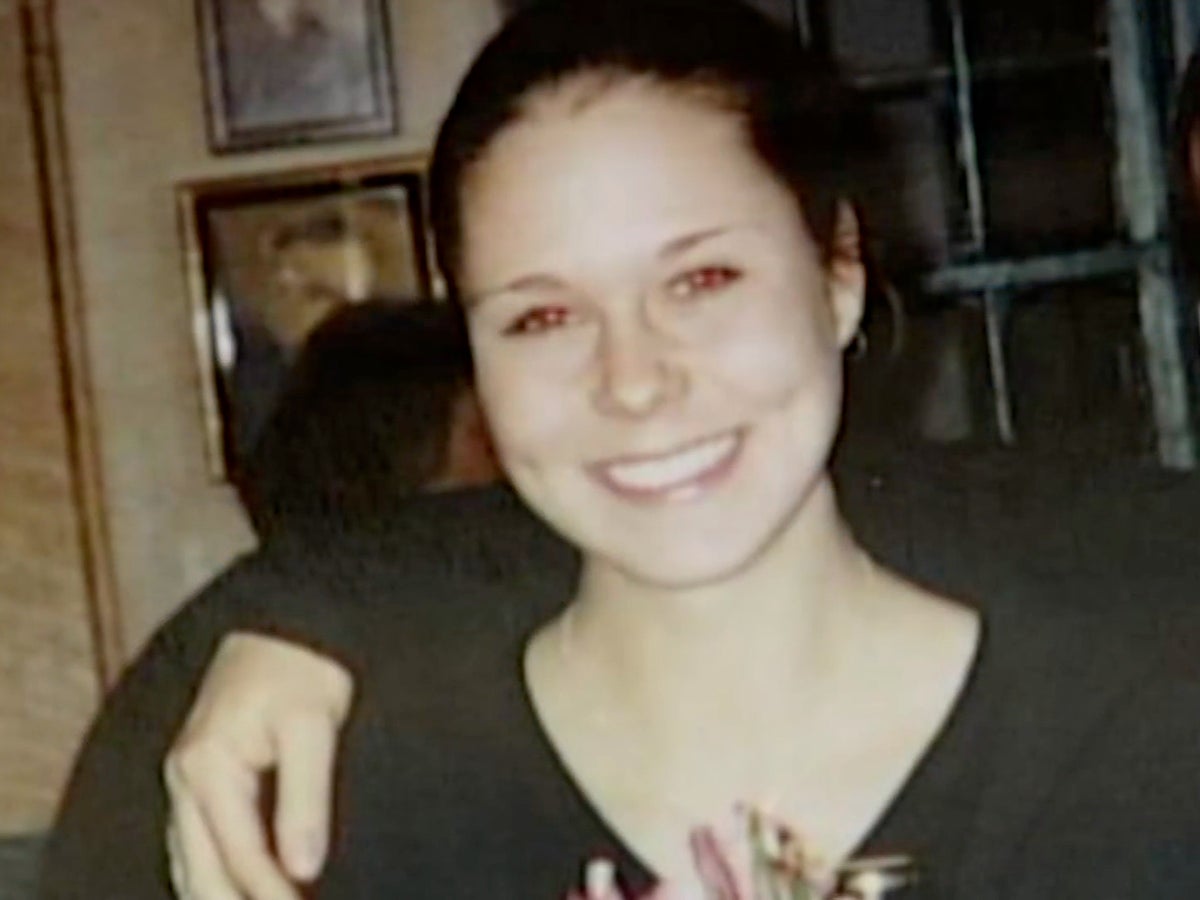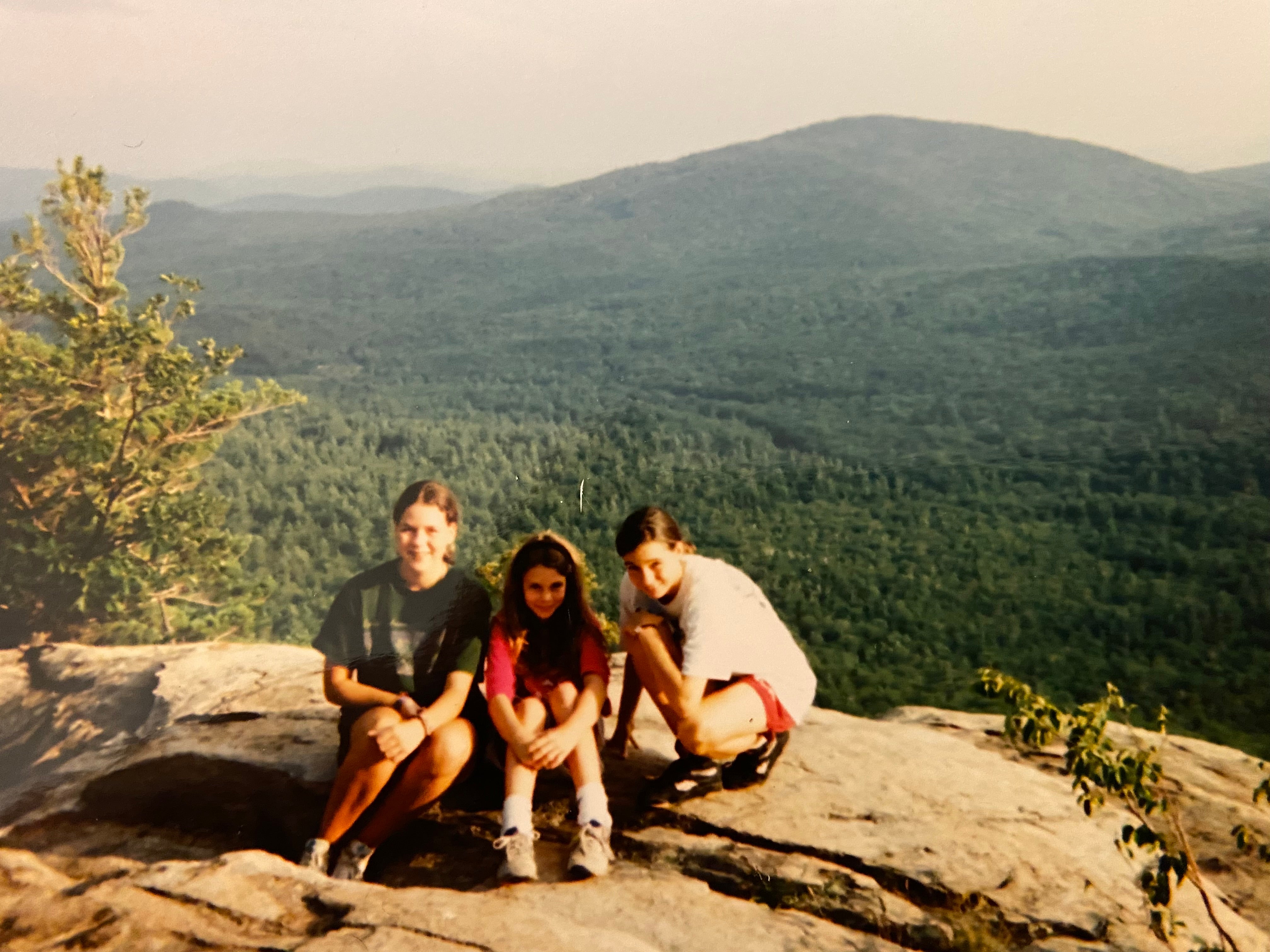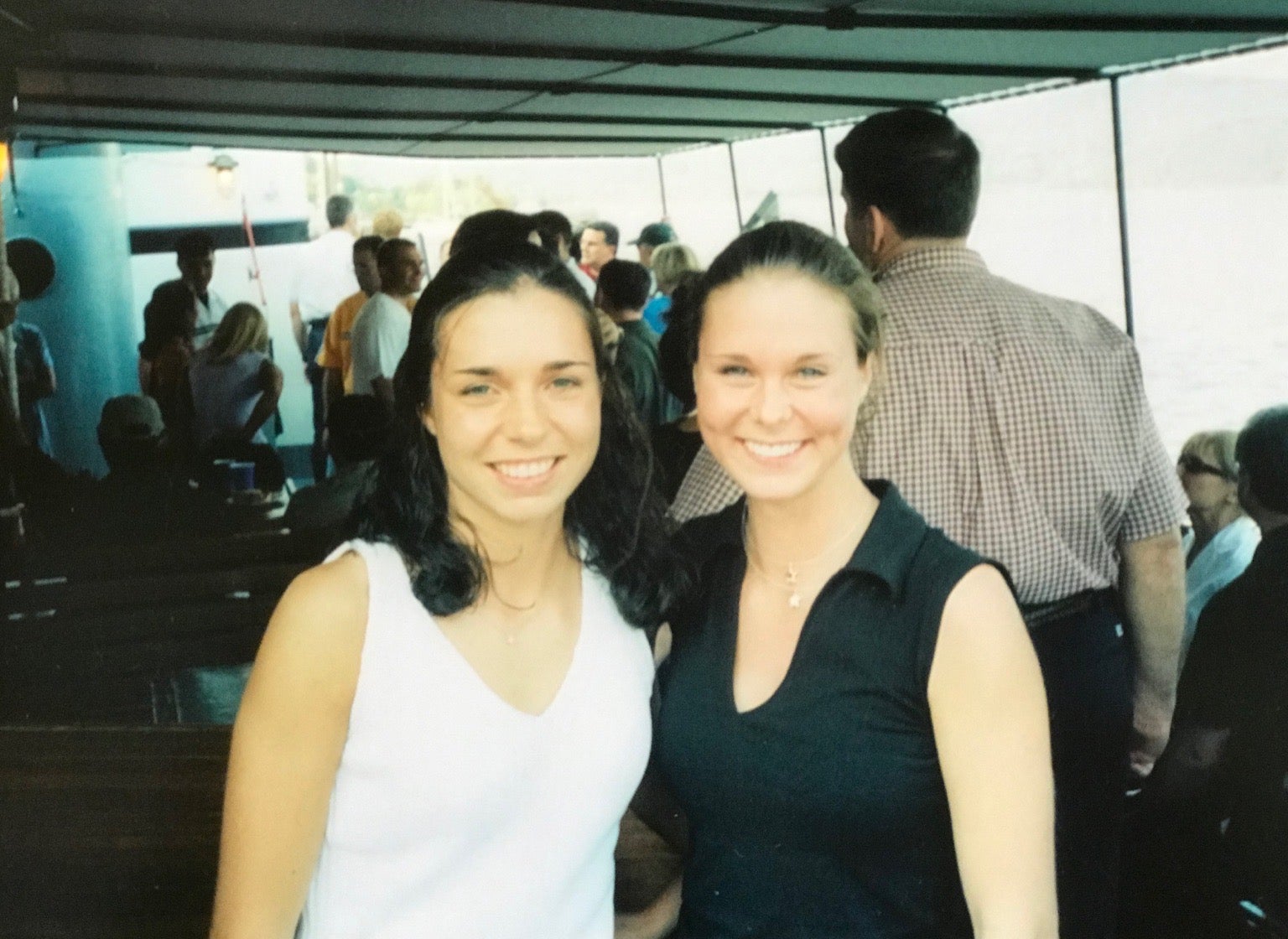
Julie Murray has a framed, handwritten note from her little sister in the living room of her Virgina home.
It’s one of the last written messages she received from her beloved younger sibling, Maura, before the nursing student vanished into thin air more than 18 years ago.
And Ms Murray was working from that same home, her dog Stoney keeping her company, when she got a call out of the blue last week about Maura – whose disappearance has tormented her family and fascinated the internet since February 2004.
There was a new search, New Hampshire authorities told the 42-year-old West Point graduate, in a phone conversation she’s become used to having. New tips and searches have cropped up sporadically over the years; Ms Murray has learned not to raise her expectations too high, despite her family’s tireless efforts to keep Maura’s mysterious disappearance at the forefront of investigators’ minds and the public consciousness.
But she was still glad to have been working from home when she got this latest glimmer of hope.
“My nerves were just shot the entire day,” Ms Murray tells The Independent, adding: “I had all kinds of mixed emotions. I still am feeling it.”
New Hampshire authorities last week searched two areas in the state near where Maura was last seen in February 2004, after she left her Massachusetts dorm room, emailed professors about a fabricated death in the family and took off through New Hampshire, crashing her car in Haverhill, near the Vermont border. She allegedly told a passerby she’d called for help; he then notified police but, by the time they arrived at the scene just minutes later, there was no sign of the smart, ambitious 21-year-old.

“The minute I got the phone call on February 9, 2004 that my sister was missing, that changed my entire life completely,” Ms Murray says. “No single day has ever been the same. And as time goes on, you have to learn to balance, and you live alongside of the ambiguous loss and the unknowing.”
There are many, many weird threads to Maura’s disappearance – sparking a firestorm of internet sleuthing and theories, not least because of her disarming smile, remarkable wit and All-American backstory.
Maura was born in 1982 to Fred Murray, a medical technician, and his wife, Laurie, a nurse; there were five children in their Irish Catholic family, and Maura not only excelled at nearly everything from a young age but also loved people – especially helping them, her sister says.
She was “humble and would write a thank you note to you if you gave Maura a piece of gum,” she adds.
“Maura was so smart,” Ms Murray says. “She had a really quick wit. And she was a fast thinker – so she was a master smack talker.
“That is the thing that I miss the absolute most – like her and I bickering back and forth. And you know, being kids from New England, s*** talking is kind of a pastime ... and that’s what brings you close.”
Not only was Maura a master smack talker, she was also a high school track star and at the top of her class – paving her way to West Point, the highly competitive military academy in upstate New York.
Her older sister, Julie, was already there – and thriving at one of the most difficult schools in the nation.
“My first year, I absolutely loved it,” Ms Murray tells The Independent. “The physicality, the pushups, the structure, the order ... I loved everything about it, except for the academics.
“So I would write back to Maura, who was still in high school, [saying] ‘You need to apply, you need to come here with me, we’ll be on the track team together, you’re gonna crush it. You’re gonna love it.’
“And you know, Maura excelled all through high school – made nationals in the two-mile ... scored almost perfect on the SATs. So she came in there, no problem getting in. And the first summer is the hardest summer, where you do all the military training. All the stuff that I loved, Maura did not love.
“And I was so shocked that she didn’t love that stuff.”
She vividly remembers one night when she tried to sneak Maura treats – items such as cookies being restricted in the heavily disciplined programme – and found her sister “bawling her eyes out” in her dorm room.
“But she did stick out the first year,” Ms Murray says. “And then it was in the second year where she started to make really dumb decisions, really poor decisions – so I knew she didn’t like it.”

During Maura’s second summer, while she was training with cadets at Fort Knox, she stole a small amount of makeup from a store on base – and got caught.
“That forced her to have to go through the honor committee,” Ms Murray says. “Because cadets cannot lie, cheat or steal or tolerate those who do ... so, after I found out about that, I asked her, ‘Why?’ And she’s just like, ‘I don’t even know; I had the money.’ And I said, ‘Did you just forget to pay?’
“I thought that that may have been a cry for help.”
Maura was put through cadet-run internal proceedings – during which her sister served as a character witness – before being handed down a punishment requiring her to march back and forth, in full uniform with a rifle, in all types of weather.
“That was rough for her, to go through that, because then she was missing track meets and missing classes,” Ms Murray says. “So then her grades dropped, and it’s hard to get back from [that], and then she had to do the cadet punishment ... all of the things combined, I think, prompted her to decide: Hey, I don’t want to do this.’”
Maura left before the honour committee came back with a final decision, Ms Murray says. She transferred to UMass-Amherst and enrolled in its highly competitive nursing programme, following in the professional footsteps of her mother.
“I believe, if she had become a nurse, she would have probably went on to try to be some sort of nurse anaesthecist or MD ... I always picture her as being a nurse anaesthecist just because of the math portion,” Ms Murray says.
She’s aware that she’s speaking about her sister in the past tense.
“That is part of this ambiguous loss that I talked about,” she says. “So ambiguous loss can be the most challenging ... I can never complete the grieving process, because I don’t have any sort of resolution.
“So I go through these ruminating thoughts all the time ... it’s not black and white for me. I live in that gray area all the time, because I don’t know; I have no control.
“We’re a society where we want to master things, you know, we want to problem-solve – and for 18 years, I can’t. And you’ll see families like mine switch between present and past tense, because it’s that unknown. And so early on, I would say ‘is’ because, obviously, I’m holding out hope.
“But as time goes on, I’m less and less likely to think that she’s alive. But of course, I still hold out hope. But it’s just one of those things that unresolved loss and unresolved trauma does to your mind. Sometimes I say ‘is.’”
And then there are times, such as now, when Ms Murray uses “was” – because no one knows exactly what happened after Maura’s life began to seemingly become more complicated after her departure from West Point.

While a nursing student at UMass Amherst, Maura also worked as a security guard and, according to reports, became so upset that she had to to leave her shift on the night she eventually set off from her dorm room towards New Hampshire. She inexplicably sent an email to professors about having to leave after a death in the family that hadn’t happened.
“I think, definitely, the family email was Maura’s way of ensuring that she could get time away from school without anyone asking additional questions,” her sister tells The Independent. “I mean, it’s the classic excuse ... no one’s going to follow up with that.
“I don’t know whether she was going to meet somebody or just go and clear her head, but everything indicates that she planned to come back, because she was making future plans. I mean, she planned a spring break trip with me. She was trying to get tickets to [comedian] Dane Cook with her friends.”
She adds: “She packed her textbooks, she turned in her homework at like, 3am the night, the morning that she disappeared. Who turns in their homework before they disappear forever? Nobody.”
There had, indisputably, been a lot going on with her younger sister since her time at West Point. Three months before her disappearance, she’d gotten into minor trouble for using stolen credit card information; days before she was last seen, she’d crashed her father’s car in the early-morning hours after a party.
No breathalyzer results were recorded, but Ms Murray says Maura was shaken by the incident – which happened on a Saturday. She vanished on the Monday.
In the intervening days, though, “she had to go to the Massachusetts DMV ... to pick up accident forms in order to fill them out,” Ms Murray says. “And she picked those up before she left UMass or left Amherst, right? So another example of future planning.”
With little more than her books, clothes, some alcohol and a book about hiking in the White Mountains – where she’d vacationed as a child with her family – Maura left campus and drove to New Hampshire. Investigations later showed she’d looked up directions to Vermont and accommodations there.
“She was under a lot of stress,” Ms Murray tells The Independent. “And she was her own worst critic. So the accident that she caused, and damage she caused my dad’s car ... two nights prior on Saturday, would have really, really upset her – because she would have felt like she [let] my dad down.
“There’s nothing anyone could have said that would have been worse than what she told herself on how bad that was, even though it wasn’t that bad. But you have to remember: we’re talking about a 21-year-old, and her view on life is very limited.
“And so something like that? Catastrophic ... So she was either going to super stress, and she was either going because she needed a break and she wanted to head to an area that was familiar to her, which was the White Mountains in New Hampshire, where my family spent every summer of our entire lives. Or she was planning to meet someone.”

Does she have any theories on who that might have been? Maura allegedly told no one where she was going, and investigators discovered no communication with anybody regarding plans in the area.
“No, but I want to know why that person hasn’t come forward, if that is the case,” Ms Murray says.
Her younger sister had a boyfriend who was living in Oklahoma; he told media and investigators, at the time, about slightly evasive messages he’d received from Maura.
The internet had a field day with the case, positing wild theories and even attacking the Murray family. Maura disappeared the same week that Facebook launched – and her friends and family used that to their advantage, though social media turned out to be something of a double-edged sword, to put it mildly.
“Initially, it helps, because the internet is a powerful thing,” Ms Murray says. “We were able to get the word out to a massive amount of people quickly, and that was critical the first couple of years, because there’s no way my little family could have travelled all up and around New England, putting flyers on trees and at supermarkets and gas stations, although we did, you know, the first couple years.
“But the internet made us able to get the awareness out there,” she says, adding ruefully: “I wish that it stayed that way.”
Instead, theories – and a constant picking-apart of Maura’s life and decisions – burgeoned alongside the exponential growth of the internet.
“What it’s turned into is more of a voyeuristic approach to looking at these types of cases and tragedies, where the tragedy becomes entertainment for folks sitting behind a keyboard,” Ms Murray says. “And it’s actually, in Maura’s case, it’s become people’s pastime. I mean, there’s people out there that do this case on Reddit and whatever other forums all day and all night ... her 21-year-old decision-making skills have been plastered all over the internet.
“And she's a voiceless person and can't stand up for herself. So that's where I come in. And I have to try to tamp some of that down. But it's impossible.”
She’s had her own theories over the years, she says. There have been developments that seemed major – the discovery of remains not far from where Maura was last seen, cadaver searches of properties, other investigations.
Nothing so far has solved the mystery, and Ms Murray’s mind – along with those of the rest of her family and others doggedly following the case – could easily run wild.
“One of my my biggest fears, and something I think about all the time, is:Is she being held captive against her will? That terrifies me,” she says.
She unwaveringly counters the theories that Maura, with her sharp intellect and skills, could have chosen to disappear at a tumultuous time in her life.
“Listen, I grew up with Maura,” she tells The Independent. “I know Maura. I know what she, who she, was, what her character was. And if you were able to reach out to my family, especially when my mom and my sister both had a long struggle with cancer and passed away, I'm sorry – she would not ... have just abandoned us, right? So if she were able to reach, she would.”
Ms Murray says: “It's another layer of the craziness of the story that my mother actually passed away on Maura’s birthday .... she was put on life support and hung in way after the nurses and doctors told us she only had hours left.
“And she hung in way longer than expected until Maura’s birthday.”
Another sister, Kathleen – one of the last people to speak with Maura – has also passed away since the student’s disappearance.
“Kathleen passed away on Thanksgiving Day,” Ms Murray says. “I don't know what it is with my family with these deaths ... So Kathleen passed away with the same exact cancer that my mom had. That was rough. And she was only 44.
“So yeah, my family has a lot of trauma. But of course, I mean, [it] must have been excruciating for [them] to not know. I mean, it's excruciating for me not to know, and I'm still here.”
Authorities last week, strangely, said no new information had led to their one-day search near Haverhill; the Murrays, over the years, have been critical of law enforcement’s response to Maura’s disappearance.
“My dad, he was just even keel,” Ms Murray tells The Independent. “He was happy that they were doing a search. He did say, ‘It's about damn time’ – and that’s sort of his typical bulldog-type of response.
“But ... he has held out hope” and believes the case is “solvable, as do I. And I mean, he was happy. Everyone in my family is happy that they're actively searching. And ... I always say that our biggest fear is that you [might] become a file [in] a cabinet.”
Ms Murray is proactive on social media, including TikTok, tapping into resources that didn’t even exist when her sister was last seen.
“The biggest way to help not only my case, but other cases of missing people, is to continue to spread awareness – because I believe that there's somebody out there that knows something,” Ms Murray says. “And either they haven't said it yet, or they don't even know that what they know is significant.
“So if we continue to spread awareness, then we might reach those one or two people that know something, and be able to put this puzzle together – because right now, we're just we're missing a couple pieces ... well, more than a couple or missing a lot of puzzle pieces to solve this. But by not keeping her story alive, we're never going to reach those people.”
She points out that Maura has “almost been missing for as long as she was here”
“So I have pictured her walking in the door, and just like, s***-talking immediately,” Ms Murray laughs. “And I just love, I love, thinking of that. But it makes me sad, because I highly doubt that that will ever happen.
“And she does come to me in dreams. But I actually ... can't communicate with her verbally in the dreams.”
She adds: “So that's kind of the only image I have ... she walks in, but I can't say anything to her. But yeah, it's just kind of like frozen grief, I think is the term.”
Families like the Murrays, she says, “have to learn to live with it.”







